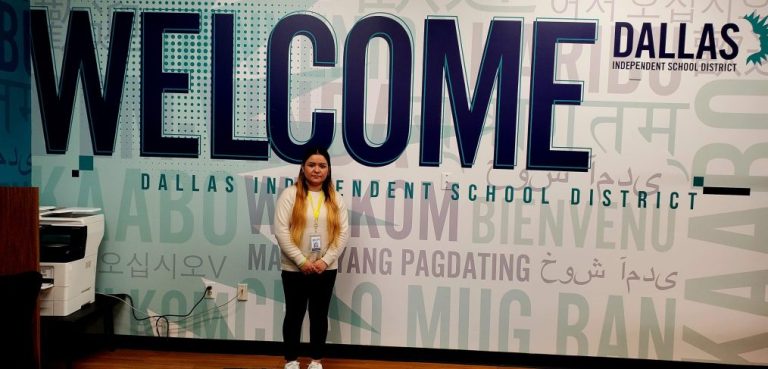Language professionals play an important role worldwide in connecting nations, fostering peace and understanding, and encouraging growth and development. The team of almost 30 translators and interpreters in Dallas ISD who help connect families, students, and schools is no different.
Their efforts toward engagement and understanding and those of interpreters and translators worldwide are celebrated and recognized on Sept. 30 during International Translation Day. The day was established in 2017 through a resolution from the United Nations General Assembly.
“The theme for this year’s International Translation Day is ‘translation unveils the many faces of humanity,’ and that’s exactly what our district interpreters aim to do,” said Adriana Saucedo, director of Translation Services. “We are shining a light on the incredible diversity in our district by being the voice of the district’s students and families who speak different languages,” she said.
The newest member of the district’s Translations team creating opportunities for students and families is Shokria Afshari, a Pashto interpreter. Afshari, who was previously a community interpreter and volunteer helping the Afghan community, recently joined the district as an interpreter and as a tutor, providing academic support to Pashto-speaking students.
Before her district role, she was already helping community members living in Dallas with the language barrier by assisting with things such as opening a bank account or making a doctor’s appointment.
Afshari, who moved to Dallas from Afghanistan two years ago, admits that she is still making the transition to adjusting to her new country, and is able to relate to the community she serves.
Beyond language, Afshari also helps the families and students she serves understand the cultural differences. For example, she says that something simple like smiling at someone could be construed as something negative in her country, but here in the United States, it is a positive thing.
Afshari, who also speaks Dari and Farsi, learned English in her native country, and was a teacher who taught English and Pashto languages to children. Currently, she is providing academic support for two high school students in the district.
“I’m very happy because I get to help a lot of Afghan families,” Afshari said. “Many times they tell me that they have challenges finding someone that can translate to English, so they are happy that I’m in this role too.”
In addition to Pashto, Translation Services provides interpretation and translation services for Spanish, Arabic, Burmese, Chin, Kirundi, Kinyarwanda, and Swahili. Dallas ISD is one of the districts in the state leading the way in bridging the gap of communication.
Services offered include document translation, meeting interpretation, and the interpreter hotline that schools can access for immediate interpretation needs. Translation Services also offers academic support for students in Arabic, Burmese, Chin, Kirundi, Swahili, and Pashto.
“With the addition of Pashto we are able to serve members of the Afghan community who have resettled in Dallas in the last two years,” Saucedo said. “We saw the need in the district to expand our services and are happy to serve this community.”
To learn more about the different services offered through Translation Services, visit dallasisd.org/translationservices.

